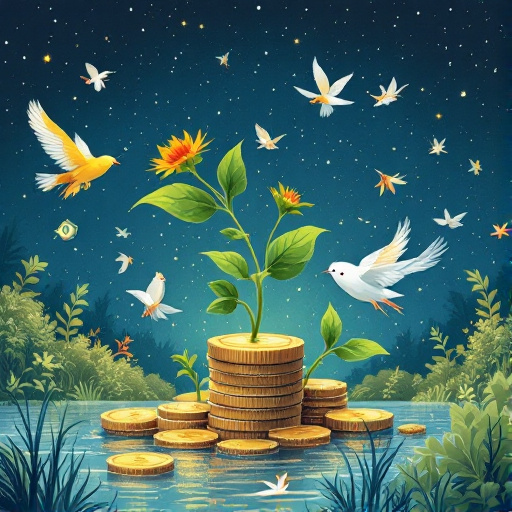Featured Articles
- Beyond the Balance Sheet: Uncovering the Psychology of Money Risk Management in Everyday Decisions
- Cryptocurrency Swaps: Unraveling the Hidden Risks in Peer-to-Peer Money Management Strategies
- Hidden Risks: How the Rise of AI in Finance Could Upend Traditional Money Risk Management Strategies
- Navigating the Unseen: How Behavioral Economics Shapes Money Risk Management Decisions
- "Reckless Robots: How AI in Finance Sparks New Risks in Money Management Beyond Human Oversight"
Whimsical Wealth: Exploring How Unconventional Hobbies Can Mitigate Financial Risk in Today’s Economy
Whimsical Wealth: Exploring How Unconventional Hobbies Can Mitigate Financial Risk in Today’s Economy
In today's unpredictable economy, engaging in unconventional hobbies not only sparks joy but can also serve as a vital strategy to mitigate financial risks. This exploration delves into the ways these whimsical pursuits can lead to unexpected income streams and financial security.
The Case for Unconventional Hobbies
Picture this: You're sitting in your cluttered basement, surrounded by antique dolls and an aisle of board games. Your friends might think you've crossed the line into eccentricity, but did you know that collectors are often sitting on small fortunes? According to the National Association of Collectors, collectibles can appreciate in value over time, and in a 2023 study, nearly 30% of collectors reported that their collections offered them a financial safety net during uncertain times. Unconventional hobbies can, indeed, have more than just sentimental value; they can become lucrative assets.
Turning Your Passion into Passive Income
Consider the story of 28-year-old Julia, an urban gardener in Chicago, who transformed her apartment balcony into a vibrant vegetable patch. Initially, it was a simple hobby born out of a love for fresh food and sustainability. However, she soon began selling her homegrown produce at local farmer's markets. By incorporating local organic gardening practices and aligning with eco-friendly trends, Julia made about $500 a month, which significantly helped her pay off student loans and effortlessly eased her financial worries.
Financial Resilience Through Diversification
The concept of diversifying investments is not just for stocks and bonds; it's equally applicable to personal hobbies. For those who enjoy crafting, websites like Etsy and Craftsy provide platforms to monetize handmade goods. In fact, a recent report from McKinsey indicated that the market for handmade goods has grown by more than 30% in the last five years. Establishing an income stream from a hobby allows individuals to hedge against job loss or volatile market conditions, something the 2008 financial crisis taught many of us.
Laughing All the Way to the Bank
“Why did the scarecrow win an award? Because he was outstanding in his field!” If you think that wasn’t funny, you might reconsider if you knew that growing a comedy hobby into a microbusiness is a legitimate financial strategy! From open mic nights to improv classes, these belly laughs can also translate to cash flow. A 2022 survey indicated that 21% of comedians supplement their income through performances and merchandise sales. The key takeaway? Humor can be a form of therapy that pays off, quite literally!
Case Study: The Ocarina Operator
Meet Dave, a 35-year-old musician who fell in love with the ocarina, a wonderfully whimsical wind instrument. What started as a fun means to destress during his finance job evolved into a full-fledged side hustle. He began sharing Ocarina tutorials on YouTube, quickly racking up views and, consequently, ad revenue. As of late 2023, Dave earns nearly $1,200 a month from this passion project. This unconventional hobby not only provided him with creative satisfaction but also helped him build a financial cushion.
No More Mundane Investments
In traditional investment conversations, we often hear about stocks, bonds, and mutual funds. But did you know that hobbies can function as a hedge against traditional financial risks? Take the case of gardening again. According to U.S. News & World Report, nearly 78% of gardeners reported that growing their own food has saved them significant sums on groceries. Upfront costs for seeds and soil can be low, and with the rising food prices, growing your own produce is increasingly looking like a savvy investment.
Finding Community in Unconventional Quarters
Communities often form around shared interests, leading to networking opportunities and financial strategies that wouldn’t have been available in conventional settings. Engaging in hobbies like knitting circles or gaming guilds can also foster ties that lead to job opportunities. A study by Harvard Business Review found that 38% of individuals who actively engaged in hobby-related communities reported increased job leads and higher incomes within a year.
Breaking Away from Traditional Financial Advice
Are you tired of reading about investments and retirement strategies that seem to apply largely to banking professionals? The truth is, finance doesn’t have to be a monotonous slog through spreadsheets. Unconventional hobbies invite creativity and foster resilience. For instance, an amateur photographer selling printed photos online or a video game enthusiast writing guides for gamers can gain both enjoyment and supplemental income. If skepticism persists, remember this—many unregulated hobbies have turned into million-dollar industries. The opportunity is enormous!
What’s Your Whimsical Wealth?
It’s essential to consider what brings you joy and how you can turn that into a financial asset. Do you love baking? Start selling your delicious creations and learn to minimize waste while maximizing profit margins. Perhaps you’re a whiz at video editing? Offer your skills on freelancing sites. The age of the internet allows rare treasures—those specific talents and prime opportunities—to thrive.
Common Misconceptions Debunked
Some might argue that engaging in hobbies for profit diminishes the joy derived from these activities. Not necessarily! In fact, a survey published in the Journal of Economic Perspectives found that 56% of people who turned their hobbies into income-generating ventures reported increased satisfaction and happiness. This is often due to the financial security that comes with additional income, all while engaging in something they genuinely love.
The Power of Digital Platforms
The proliferation of online platforms creates a fertile ground for hobbyists to legitimize and monetize their interests. Whether through social media, e-commerce, or content sharing, you are only a click away from turning your passions into profit. For instance, TikTok has become an unexpected income generator, with several creators turning their love for styling outfits into substantial revenue streams simply through follower engagement and brand partnerships.
A Final Word on Whimsy Over Worry
So as we navigate today's complex financial landscape, remember to look beyond the spreadsheets and balance sheets. Embracing the whimsical can actually cultivate real wealth, both in joy and monetary gains. Whether you channel your inner chef, craft artisan jewelry, or even delve into the world of financial consulting as a hobby, the unique essence of what you love can become a workshop for wealth creation.
In closing, your hobbies may hold more power than you realize—not only can they bring immense joy, but they also offer a pathway to secure your financial future. When you explore them with the right mindset, you might just discover your own brand of whimsical wealth.




